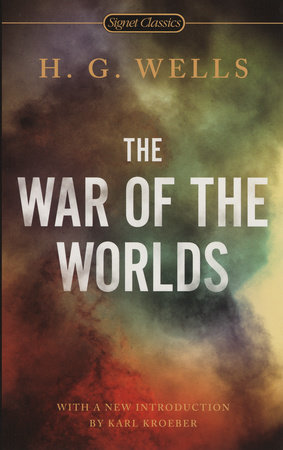Book Review: The War of the Worlds by H.G. Wells
Early in the Twentieth Century, odd flashes of light are seen on the surface of the planet Mars. This phenomenon is highly interesting to scientists, but seems irrelevant to most people going about their lives on Earth. That is, until what is initially mistaken for a meteorite lands in a rural area southwest of London. Upon investigation, it’s revealed to be artificial, and inhabited by living beings. Martians!

It soon turns out that the Martians did not come in peace, as they put together war machines far superior to anything humans have in the way of weapons, then use them on the surrounding Earthlings. More and more Martian spacecraft arrive. Soon London is attacked and its people are slaughtered or flee. “War” is perhaps a misnomer. “Rout” is more indicative of how the handful of Martians deal with the British military.
This 1898 novel was inspired in large part by the events in Tasmania in the 1820s and 1830s that resulted in the near destruction of the aboriginal population by British and Australian colonists. How would Britons feel, wondered Wells, if technologically superior beings invaded their island to turn it into a colony?
Invasions of Great Britain were a popular theme in British fiction of the time, positing a German or allied European army taking over. This would normally be accomplished by some form of treacherous attack (like a Channel Tunnel) accompanied by a craven weakness in the British Government (usually attributed to the political party the author didn’t like) hobbling the British military. But Wells was the first to posit it being done by space aliens using weapons that weren’t just extensions of existing technology.
This allowed the novel to move a bit away from politics of the day (“Germans bad”) and into a larger philosophical context. How do humans react against an enemy that is to them as humans are to ants?
As is the case with Wells’ previous novels, our nameless narrator is a bit of a stumblebum, though clearly modeled on Wells himself as a “philosophical author.” He manages to accidentally kill a horse he borrowed, and is only saved from having to explain this by the owner being killed by the Martians a couple of pages later. He survives largely by accident, though is smart enough to not do suicidal things.
Several chapters are devoted to the adventures of the narrator’s brother, who witnesses the mass of refugees fleeing London, and manages to get to France.
Mind, the Martians aren’t invulnerable in this story. Hidden artillery manages to destroy one war machine and temporarily cripple another. The Martians compensate by unleashing the Black Gas to eliminate any possible hidden units. And the ramship Thunder Child manages to take out two more war machines by suicidal tactics, but that is the last time we hear of Earth ships getting a chance against Martians.
Wells does a good job of postulating an alien species with very different biology, technology and design philosophies. The eventual “germs kill the Martians” ending is foreshadowed several times.
One aspect of the book that doesn’t get much emphasis in movie adaptations is the time the narrator spends with the curate. The curate’s rigid thought patterns cause him to see the Martians as a punishment from God for humanity’s sins, but will not let him move on to develop healthy coping skills. Indeed, he becomes a positive liability to the narrator’s survival, and the narrator doesn’t feel particularly guilty when he leaves the curate in a position to be found by the Martians.
The artilleryman is more likely to appear. He’s a survivor, and he has fairly grandiose ideas about how mankind can continue to survive despite the Martian occupation. His plan might actually have worked! But the narrator quickly realizes that the artilleryman is much more talk than action and moves on.
The ending is less triumphant than relieved. Yes, humanity survived this round, and has plans in place. But what if the Martians learned from their first failure? And is their invasion of Venus going better?
Since this book was published, there have been many, many more tales of alien invasions, not to mention direct adaptations of the original. So modern audiences may find this book a bit cliched-feeling, and missing some of the kind of scenes movies like to show. Still, this is a classic, and well worth reading through to see where so many imitators began.
Let’s watch the trailer for the 1953 George Pal movie!

